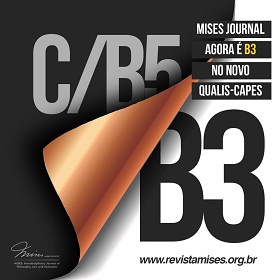O perigo do intervencionismo
como salvar o liberalismo brasileiro à moda Thatcher
DOI:
https://doi.org/10.30800/mises.2024.v12.1539Palavras-chave:
Thatcherismo, Intervenção Estatal, Liberdade econômica, Análise histórica, Livre MercadoResumo
O artigo analisa o intervencionismo no Brasil após a Constituição de 1988 em comparação com a intervenção governamental da Grã-Bretanha após a Segunda Guerra Mundial. Através dessa comparação, passando pela rápida definição de intervencionismo e da complexidade do livre mercado, busca-se definir como o modelo governamental e econômico aplicado na Inglaterra por Margaret Thatcher pode ser adaptado ao contexto brasileiro atual. A aplicação do thatcherismo no Brasil implicaria na redução das funções do governo, gerando uma eficácia maior por direcionar o foco para menos preocupações, além de aumentar o livre mercado e, por conseguinte, a liberdade do indivíduo para empreender e gerir suas economias com uma considerável redução nos impostos. Um Estado forte não é aquele que possui diversas obrigações, mas sim aquele que cumpre bem as que lhe couberem, propiciando aos indivíduos que possam tomar a maioria das decisões de sua vida e de seus lares sem intervenção do poder estatal.
Downloads
Referências
Comparato, F. K. (1990). The Economic Order in the Brazilian Constitution of 1988. JSTOR, The American Journal of Comparative Law, 38(4), 753-771. https://doi.org/10.2307/840611 DOI: https://doi.org/10.2307/840611
Farrall, S., & Hay, C. (2010). Not so Tough on Crime? Why Weren't the Thatcher Governments More Radical in Reforming the Criminal Justice System? The British Journal of Criminology, 50(3), 550-569. https://doi.org/10.1093/bjc/azq015 DOI: https://doi.org/10.1093/bjc/azq015
Friedman, M., & Friedman, R. (1980). Free to Choose: A Personal Statement. Harcourt Brace and Company.
Gardiner, N., & Thompson, S. (2022). Liderança segundo Margaret Thatcher: lições para os empreendedores de hoje (2nd ed.). LVM Editora.
Gonçalves, L. N. (2011). Finalidades e Limitações da Intervenção do Estado na Economia sob a ótica da Constituição da República de 1988. Revista de Direito Econômico e Socioambiental, 2(1), 83-99. https://doi.org/10.7213/rev.dir.econ.socioambienta.02.001.AO04 DOI: https://doi.org/10.7213/rev.dir.econ.socioambienta.02.001.AO04
Harris, K. (1988). Thatcher. Little, Brown and Company.
Harrison, B. (1994). Mrs Thatcher and the Intellectuals. Twentieth Century British History, 5, 206-245. https://doi.org/10.1093/tcbh/5.2.206 DOI: https://doi.org/10.1093/tcbh/5.2.206
Hayek, F. A. (1994). The Road to Serfdom. The University of Chicago Press.
Jennifer, B. (2014). Across the Great Divide: Free Markets from Right to Left. Modern Intellectual History.
Lewis, P. (2023). The Hand Behind the Invisible Hand: Reflections on a Recurring Theme in Classical Liberal Political Economy. Contributions to Political Economy, 42(1), 78-100. https://doi.org/10.1093/cpe/bzad010 DOI: https://doi.org/10.1093/cpe/bzad010
Lockwood, C. (2020). ‘Action Not Words’: The Conservative Party, Public Opinion and ‘Scientific’ Politics. Twentieth Century British History, 31(3), 260-386. https://doi.org/10.1093/tcbh/hwz014 DOI: https://doi.org/10.1093/tcbh/hwz014
Mises, L. von. (2018). As seis lições (9th ed.). LVM. DOI: https://doi.org/10.30800/mises.2013.v1.225
Nogueira, J. H. de S. (2021). The Destroyers of Capitalism: Constitutional Amendment Proposal (PEC) nº 69/2019 and the National Strategy for Business and Impact Investing. MISES: Interdisciplinary Journal of Philosophy, Law and Economics, 9. Retrieved from https://revistamises.org.br/misesjournal/article/view/1426 DOI: https://doi.org/10.30800/mises.2021.v9.1426
Norton, P. (1990). ‘The Lady's Not For Turning’ But What About The Rest? Margaret Thatcher And The Conservative Party 1979–89. Parliamentary Affairs, 43(1), 41-58. https://doi.org/10.1093/oxfordjournals.pa.a052236 DOI: https://doi.org/10.1093/oxfordjournals.pa.a052236
Rollings, N. (2013). Cracks in the Post-War Keynesian Settlement? The Role of Organised Business in Britain in the Rise of Neoliberalism Before Margaret Thatcher. Twentieth Century British History, 24(4), 637-659. https://doi.org/10.1093/tcbh/hwt005 DOI: https://doi.org/10.1093/tcbh/hwt005
Salzer, T. (2022). Interventionism in the labor market: The real effects of the FGTS. MISES: Interdisciplinary Journal of Philosophy, Law and Economics, 10. https://doi.org/10.30800/mises.2022.v10.1456 DOI: https://doi.org/10.30800/mises.2022.v10.1456
Schoenherr, M. H. (2021). The economical intervention as the genesis of the imbalance of Brazilian markets: and the new paradigm proposed by the recent legislative changes. MISES: Interdisciplinary Journal of Philosophy, Law and Economics, 9. https://doi.org/10.30800/mises.2021.v9.1313 DOI: https://doi.org/10.30800/mises.2021.v9.1313
Sloman, P. (2017). Conservative Economic Policymaking and the Birth of Thatcherism. The English Historical Review, 132(558), 1394-1396. https://doi.org/10.1093/ehr/cex262 DOI: https://doi.org/10.1093/ehr/cex262
Thatcher, M. (1983, January 16). Entrevista por Brian Walden: Weekend World. http://www.margaretthatcher.org/document/105087
Thatcher, M. (1995). The Path to Power. HarperCollins.
Thatcher, M. (2000, March 27). Speech Accepting an Honorary Degree from Hofstra University. http://www.margaretthatcher.org/document/108387
Downloads
Publicado
Como Citar
Edição
Seção
Licença
Copyright (c) 2024 MISES: Interdisciplinary Journal of Philosophy, Law and Economics

Este trabalho está licenciado sob uma licença Creative Commons Attribution 4.0 International License.

Este periódico está licenciado sob uma Creative Commons Attribution 4.0 International License.



















